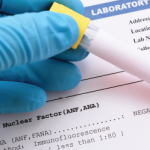Abstract 0986—BIIB059, a Humanized Monoclonal Antibody Targeting Blood Dendritic Cell Antigen 2 on Plasmacytoid Dendritic Cells, Shows Dose-Related Efficacy in a Phase 2 Study in Participants with Active Cutaneous Lupus Erythematosus
Dr. Pisetsky: A striking feature of SLE is the so-called interferon signature, a pattern of gene expression of peripheral blood cells suggesting a powerful effect of type 1 interferon (IFN). Targeting IFN can be accomplished by direct binding of the cytokine, blockade of the IFN receptor or inhibition of cytokine production by plasmacytoid dendritic cells (PDCs), which are major producers of this cytokine. This study assessed the effects of a humanized monoclonal antibody (BIIB069) that binds to blood dendritic cell antigen 2 (BDCA2), a receptor uniquely expressed on PDCs. The data presented indicate that BIIB059 can reduce activity of cutaneous lupus erythematosus (CLE). Future studies will be needed to determine which of the strategies to reduce IFN activity is the most effective and, given the key role of PDCs in immune responses, the most safe.
Abstract 0988—Two-Year Results from a Randomized, Controlled Study of Obinutuzumab for Proliferative Lupus Nephritis
Dr. Pisetsky: In view of the abundant production of autoantibodies in SLE, B cells have long been considered an important target of therapy. Although belimumab (anti-BLyS/BAFF) was approved for the treatment of active, autoantibody positive SLE, clinical trials of the anti-CD20 monoclonal antibody rituximab (RTX) did not reach trial endpoints. This result has been surprising because elimination of B cells would seem an effective strategy to reduce the various roles that B cells can play in pathogenesis. One explanation for the failure of RTX in clinical trials is inadequate reduction of B cells. This study investigated the effects of a humanized type II anti-CD20 monoclonal antibody obinutuzumab (OBI) in lupus nephritis; OBI can produce more complete B cell depletion than RTX. As the data indicated, OBI treatment showed a higher frequency of complete renal responses than controls. These findings suggest that B cell depletion can be effective in the treatment of SLE, with the degree of depletion influencing outcomes.
Abstract 1828—Comprehensive Efficacy of Anifrolumab Across Organ Domains in Patients with Active SLE: Pooled Data from 2 Phase 3 Trials
Dr. Pisetsky: SLE is a clinically and serologically heterogeneous disease. This study assessed the effects of anifrolumab, a monoclonal antibody to the interferon receptor, on various organ domains in two phase 3 clinical trials. The results indicated efficacy for musculoskeletal and mucocutaneous manifestations, which were common in the trial populations. Interestingly, these studies assessed arthritis in terms of tender and swollen joint counts, suggesting that synovitis may be more prominent in SLE than sometimes thought.

